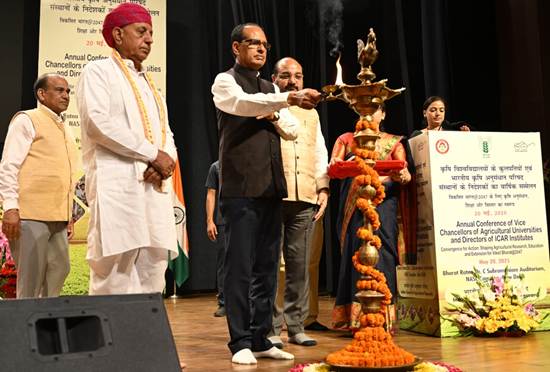NewzVille Desk
The Indian Council of Agricultural Research (ICAR) hosted the Annual Conference of Vice-Chancellors of Agricultural Universities and Directors of ICAR Institutes today at Bharat Ratna C. Subramaniam Auditorium, NASC Complex, PUSA Campus, New Delhi. Theme of the Conference is “Convergence for Action: Shaping Agricultural Research, Education and Extension for Viksit Bharat@2047”.
The Union Minister for Agriculture and Farmers’ Welfare Shivraj Singh Chouhan, inaugurated the conference and also chaired a high-level panel on reimagining the National Agricultural Research System (NARS) for India’s long-term development. Union Minister for Fisheries, Animal Husbandry and Dairying Rajiv Ranjan Singh and Minister of State for Agriculture & Farmers’ Welfare Bhagirath Choudhary also addressed the conference.
Chouhan emphasized that the Indian Council of Agricultural Research (ICAR) is the pride of the nation when it comes to research and extension. He asserted that in order to attain the vision of a “Viksit Bharat”, agriculture must be advanced, and farmers must be empowered. Referring to farmers as equivalent to God, who nurture the world; he stated that they truly deserve our respect and reverence. Ensuring their welfare and securing their livelihoods is our responsibility, he added.
Chouhan urged Vice-Chancellors to participate actively in the Viksit Krishi Sankalp Abhiyan, along with their academic responsibilities. He stressed that the real-time implementation of the “Lab to Land” initiative is the need of the hour.
Outlining a six-point strategy of the Ministry of Agriculture and Farmers Welfare for achieving the goals of a developed India, he listed increasing productivity, reducing the cost of production, ensuring fair prices for produce, compensating losses due to natural disasters, promoting agricultural diversification, and enhancing value addition and food processing. He also emphasized the need to promote natural and organic farming practices.
Minister Chouhan further stated that agricultural diversification and protecting Mother Earth are among our greatest collective responsibilities. He reiterated that science-based agricultural transformation is the ministry’s primary focus, while also integrating traditional agricultural practices. The Viksit Krishi Sankalp Abhiyan, he said, is a historic initiative in the agriculture sector, dedicated to empowering farmers, improving their livelihoods, and providing direct solutions to their problems at the grassroots level.
He announced that he would undertake a padayatra (foot march) on May 25–26 to connect directly with farmers and gain firsthand understanding of their issues. Chouhan emphasized that India’s goals include ensuring food security, replenishing national grain reserves, and establishing India as the food basket of the world. “We are one team,” he said, “and our mantra is One Nation, One Agriculture, One Team.”
The event brought together key policymakers, thought leaders, and academic experts to deliberate on strategic reforms needed to strengthen India’s agricultural innovation ecosystem.
The conference includes three core sessions ‘Reimagining NARS for Viksit Bharat@2047’, ‘Reorienting Agricultural Education’, Strategic directions for integrating research, education, and extension.
Experts, including members from NITI Aayog, former DGs of ICAR, vice-chancellors, and deputy directors general of various scientific disciplines, offered insights on aligning India’s agricultural capabilities with the vision of a developed India by 2047.






